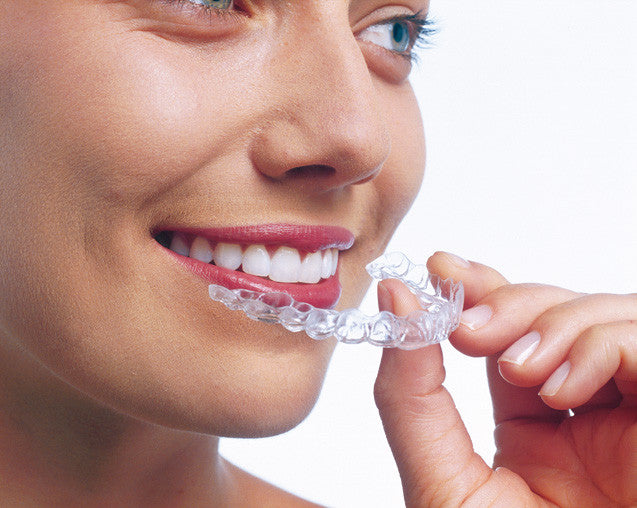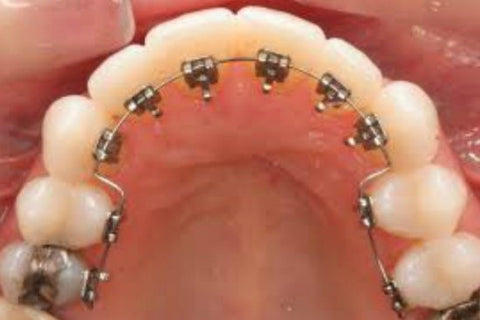Blog
Clear Braces Vs Metal Braces 0

If you are considering teeth straightening and want to know more about the options available, this blog post might be a good place to start. Whilst we will always advise you to seek expert counsel from your orthodontist before you decide on any treatment, it doesn’t hurt to do some research beforehand and learn about the experience of others before you choose the teeth straightening treatment that will suit you.
- Mohammad Malik
What to Expect When Wearing Dental Braces 0

Modern dental braces are very effective at straightening teeth and are much smaller, more comfortable and often faster than they used to be. If you’re planning on having braces, you may be wondering whether they’ll hurt and what to expect when wearing them.
- Blue Horizons
- Tags: braces care dental braces dental braces fitted how dental braces work wearing dental braces
New Year, New You, New Smile! 0
2017 is here already. New Year’s resolutions abound. Many of us plan to spend more time with friends and family, become more money savvy, and to get healthier. Others think about some personal improvements they would like to make. One of the most popular choices in this area is to take positive action to improve a smile. Of course we all smile, it’s one of the things that make us human, but for some people the act of smiling in front of others or in front of a camera is a constant reminder that they are not happy with their teeth. So if you are one of those people, will 2017 be the year you do something about it? Below are some suggestions. Whether you choose small or larger changes this year is up to you, but by making some changes you will definitely be contributing to making yourself happier with your smile.

New Habits
New Year is a great time to begin new habits. Improving your dental care regime will undoubtedly bring benefits to your teeth and mouth. Make sure that you floss regularly and brush your teeth twice daily with good technique and using a quality toothbrush.
See Your Hygienist
In addition to your own daily regime make sure that your visits to the dentist and the hygienist are booked regularly. A good hygienist can be invaluable at keeping your teeth in great condition, removing plaque and getting into the areas you find more difficult. The dentist will identify areas of concern as they arise, meaning treatment will be timely and prevent damage getting out of hand.
Lifestyle
Lifestyle changes can significantly contribute to your oral appearance. By making sure you look after your body - eating healthy choices, drinking plenty of water for hydration and doing some moderate exercise, you are keeping your health in top condition which does play a part in your dental health too. What you don’t eat and drink is particularly important. Keeping your intake of caffeine (in teas, coffees and cola’s) down low can mean the difference between stained teeth, and much more satisfactory whiter ones.
The above changes are small and achievable. But when something a little more specialist is needed we are here to help you. For most people the perfect smile consists of straight white teeth. If this cannot be achieved entirely naturally, it can still be achieved with the help of our team. These days there are many different methods of straightening teeth such as aligners, or lingual, ceramic and metal braces. There really is something to suit everyone. If you would like to know more about the treatments we offer please contact us on 0161 998 2622 or info@manchesterorthodontics.co.uk. We look forward to helping you achieve a smile you can be happy with.
- Blue Horizons
- Tags: new smile new year orthodontics straightening teeth
Maintaining Good Oral Health This Christmas 0
Christmas is the time for seeing family and friends, indulging in your favourite festive treats and celebrating the start of a new year. It’s the time to have fun and relax, as a much-anticipated change from normal daily routine. However, with all the festivities and change many people forget to maintain their oral health routine during the period, which could have a long-lasting impact on their teeth and mouth.
Maintaining good oral health over Christmas is important for keeping your pearly whites looking and feeling great for the new year, and for your overall health too. Here is our guide on looking after your teeth and gums so that they’re ready for the mistletoe!
If you’re staying away
With the excitement of staying with family or friends over the Christmas holidays, it’s easy to forget the basics - toothbrush included. Make sure to pick one up from the local shops if you find you’ve left yours at home, however if this isn’t an option it might be best to rinse your mouth with water after each meal and avoid too many sugary foods. But, to ensure that you can enjoy eating the foods you want whilst avoiding that horrible feeling of unclean teeth in the morning, why not prepare by keeping a travel toothbrush and toothpaste in your bag?
Stick to your oral health routine
With all the partying that’s likely in store you may feel too tired or forget to brush your teeth at the end of the night. Don’t let this become a habit over Christmas - not properly brushing your teeth before you sleep increases the risk of you developing tooth decay or other oral health problems. If you think you’ll forget, leave your toothbrush and keep a glass of water out by your bed to remind you. Cleaning your teeth is one of the best things you can do to preserve good oral health. You’ll thank us in the morning!
Opening presents
 Whatever you do, don’t use your teeth to open any bottles or even wrapping paper during Christmas or all year round. Doing so could damage your teeth and lead to a trip to an emergency dentist, which isn't the best way to spend your holiday. If you’ll be eating any hard foods such as candy canes or raw vegetables, just be careful when chewing them to avoid damaging your teeth - which brings us to our next tip:
Whatever you do, don’t use your teeth to open any bottles or even wrapping paper during Christmas or all year round. Doing so could damage your teeth and lead to a trip to an emergency dentist, which isn't the best way to spend your holiday. If you’ll be eating any hard foods such as candy canes or raw vegetables, just be careful when chewing them to avoid damaging your teeth - which brings us to our next tip:
Foods to avoid
Christmas is full of them - yule logs, minced pies, Christmas puddings, chocolates and sweets - but sugary foods can be frightful for your oral health. This is because the bacteria in your mouth feeds on sugar to speed up acid production, which can erode your tooth enamel and cause cavities to appear in your teeth. We’re not saying that you can’t indulge in these treats, however try to have them in moderation. It’s a good idea to rinse your mouth with water after eating sugary things to reduce the levels of sugar and acid in the mouth.
 In the same way, sticky, chewy foods can lodge between the teeth and you may not be able to easily rinse them away. Again, leaving them there could also lead to increased acids in the mouth which strip the protective layer of the teeth. We’d recommend thoroughly cleaning your teeth with a toothbrush and flossing after eating sticky foods to avoid this, especially if you’re wearing braces.
In the same way, sticky, chewy foods can lodge between the teeth and you may not be able to easily rinse them away. Again, leaving them there could also lead to increased acids in the mouth which strip the protective layer of the teeth. We’d recommend thoroughly cleaning your teeth with a toothbrush and flossing after eating sticky foods to avoid this, especially if you’re wearing braces.
Did you know that cheese is good for the teeth? It helps to restore the acid balance in the mouth to reduce the risks of tooth decay. If you like cheese, it’s a good excuse for the Christmas cheeseboard!
Drinking for your oral health
Christmas is the season to be merry and many of us may enjoy a bit of wine, bubbly or other alcoholic beverages to share the festive cheer. Those of us not consuming alcohol may also enjoy having more soft drinks, yet all of these drinks may be acidic or high in sugar. As we know this is not good for your oral health, and to limit the damage caused during the holidays it’s advisable to swish water around your mouth after consuming other beverages to wash the sugars and acid away. Sugar-free gum is also a helpful way to encourage saliva flow and neutralise the mouth.
Hopefully these tips will keep your teeth and gums in top form over the holidays. However if you’re worried about your oral health or you’d like to know more about maintaining good oral health over Christmas, you can speak to our experienced team. To book an appointment, please call 0161 998 2622, or email us at info@manchesterorthodontics.co.uk.
- Blue Horizons
- Tags: christmas good oral health at christmas oral health
Our Top Tips for Brace Care 0
Braces can help to correct a number of teeth alignment and bite problems, helping to not only improve the appearance of our teeth, but also to help make our life easier. To get the best possible results out of your braces, it’s important to practice careful brace care – this includes avoiding damaging your braces, whilst continuing with your daily oral healthcare routine.

Damaging your braces or poor oral healthcare can mean extra appointments with your orthodontist and in many cases, the length of your treatment is increased. To take the best care of your braces, be sure to follow our useful advice:
Eating
If you have braces with brackets and wires, you should take care to avoid particularly chewy foods as these can get stuck in your braces and break them. Whilst you can eat crunchy foods, such as apples; it’s advisable to cut them up into small pieces so you don’t have to bite into them.
In terms of your oral health, your teeth are much more vulnerable to problems such as tooth decay whilst you are wearing braces. It’s easy for food to get stuck behind brackets, so you should look to avoid especially sweet foods and sugary, acidic drinks such as fruit juices and fizzy drinks.
Cleaning your teeth
After every meal, it’s really important to clean your teeth using a fluoride toothpaste. When wearing fixed braces, you should take extra care, taking the time to brush around the brackets and wires, cleaning in between the teeth and where your teeth meet your gums. After brushing we also strongly recommend that you use a fluoride mouthwash.
Throughout your teeth straightening treatment, it’s important to also continue to monitor your overall oral health. Look out for mouth ulcers that last for more than 3 weeks and any unusual red or white spots as these can be signs of mouth cancer. November is Mouth Cancer Action Month, a campaign that aims to raise awareness of mouth cancer and help to save lives by promoting early detection and prevention.
Emergency care
If you take care to look after your braces carefully, emergency appointments shouldn’t be necessary, but on some occasions, it’s important to call us on 0161 998 2622. Brace emergencies can include dislodgement of the brace so that you cannot move it, as well as trauma to brace that has caused injury to your lips or cheeks. Call us immediately to leave a short message; your orthodontist will then ring you back as soon as possible.
If you have a broken wire or find that a bracket is loose, it’s also important to arrange an appointment. Even if you are due to see your orthodontist soon, it’s important to call the practice for advice as you may need an additional appointment to make any repairs that there may not be time to do during a routine appointment.
If you have any questions about brace care, contact Northenden House Orthodontics today by calling 0161 998 2622 or email info@manchesterorthodontics.co.uk.
- Blue Horizons
- Tags: brace care braces care looking after your braces wearing fixed braces

